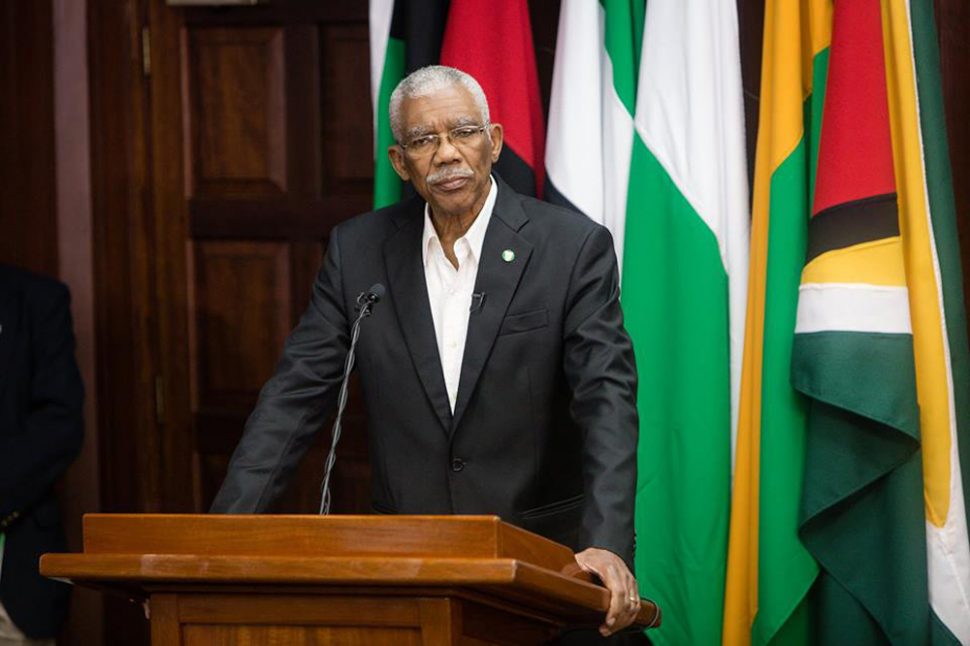Cabinet has approved the removal of custodial sentences for possession of small amounts of marijuana and the necessary amendments to existing legislation will be made after the National Assembly returns from recess, President David Granger disclosed yesterday.
“We (government) have taken a decision, in principle, that custodial sentences for the possession for small amount of marijuana for personal use would be legally abolished but after the National Assembly comes off of its recess you could look forward to that legislation being passed. So it is already a decision which is agreed within the Cabinet and we have no difficulty in implementing it,” the President said when quizzed about the matter at a press conference at the Ministry of the Presidency.
The National Assembly is due to return from its recess in October.
Concerns have been raised about the lengthy sentences given to persons caught with small amounts of cannabis. In many cases, such persons receive the same sentence as those caught with large quantities of either cannabis or cocaine. In wake of the widespread outrage that was triggered in May by the sentencing of Carl Mangal to three years in jail for the possession of 8.4 grammes of cannabis for trafficking, both parliamentarian Michael Carrington and the Alliance For Change (AFC) renewed calls for the repeal of heavy custodial sentences for possession of small quantities.
Subsequently, Granger said that the removal of custodial sentences for possession of small amounts of cannabis is on the cards for Guyana. A report in the Guyana Chronicle had said that the President made it clear that there will be no industrialisation of marijuana production in Guyana.
The president made the comments on the same day that State Minister Joseph Harmon told the media that government’s position on the possession of cannabis will depend on the final report of the CARICOM Regional Commission on Marijuana and the findings of a Ministry of Health survey. CARICOM Heads of Government gathered in Jamaica at the time were considering the recommendations contained in the Commission’s report, which in part calls for the dismantling of the mechanism that prohibits its use in its entirety.
A Narcotic Drugs and Psychotropic Substances (Control) (Amendment) Bill, intended to address the sentencing provisions of the law, was tabled by Carrington in December 2015, and has been left to languish in legislative purgatory since that time. Following Mangal’s sentence, Carrington had told this newspaper that he would make amendments. He was working towards getting the bill tabled before Parliament went into recess last month.
Opposition Leader Bharrat Jagdeo has said that he personally supports the decriminalisation of small amounts of marijuana and that members of the PPP/C would be allowed to vote according to their conscience.
The report of the Regional Commission on Marijuana, which was compiled after region-wide consultations, was presented to the CARICOM Heads of Government at its last annual conference in Montego Bay, Jamaica, last month for consideration. At the conclusion of the conference, CARICOM Chairman and Jamaica’s Prime Minister Andrew Holness reported that the regional heads agreed that action is necessary at the national level by the relevant authorities to review the relevant status of marijuana as a schedule one drug, with a view to reclassification.
They also agreed, he said, that each member state would determine its own pathway to pursue the law reforms necessary as proposed by the Commission, in keeping with its own circumstances.
The Commission recommended that CARICOM states reclassify cannabis as a “controlled substance” instead of as a “dangerous drug” or narcotic.
“The analysis of the comprehensive information gathered indicates that the current legal regime for cannabis/marijuana, characterised as it is by prohibition and draconian criminal penalties, is ineffective, incongruous, obsolete and deeply unjust. After considering the most up to date evidence and the views of Caribbean peoples, the Commission is unanimous in its view that the status quo with respect to the legal regime governing cannabis/marijuana cannot be maintained and legal reform should be a priority for Member States,’” the Commission declared in its report.
The report, seen by this newspaper, also noted that CARICOM states should have a margin of appreciation as to how to achieve this ultimate goal, either by complete and immediate removal of all prohibitive legal provisions, thereby rendering cannabis/marijuana a legal substance regulated only in strictly defined circumstances, or, as a preparatory step, the decriminalisation of cannabis/marijuana for personal use in private premises and medical purposes.





